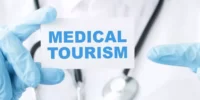Accessible Healthcare: Medical Tourism For Individuals With Disabilities
Are you someone with a disability who is struggling to find accessible healthcare options in your home country? Have you considered medical tourism as a solution? Medical tourism, the practice of traveling to another country for medical treatment, is becoming increasingly popular among individuals with disabilities who are seeking high-quality and affordable healthcare.
In this article, we will explore the benefits and challenges of medical tourism for individuals with disabilities, as well as provide tips for researching and preparing for medical travel.
Medical tourism can offer a range of benefits for individuals with disabilities, including access to specialized medical facilities and services, lower costs, and shorter wait times. However, there are also unique challenges to consider, such as navigating unfamiliar healthcare systems and ensuring that accommodations and transportation are accessible.
By understanding these factors and doing thorough research, you can make informed decisions about your medical travel options and find the best possible care for your needs.
Key Takeaways
- Medical tourism can offer cost savings, access to specialized treatments and procedures, and advanced medical technologies for individuals with disabilities.
- However, physical accessibility, language barriers, and cultural differences can pose challenges for disabled individuals seeking medical tourism.
- To embark on medical tourism, it is important to research and find reputable healthcare providers, check qualifications and accreditation of medical facilities, and communicate specific needs with healthcare providers.
- Accessible transportation and accommodations, as well as utilizing resources and support from organizations, are also important considerations for disabled individuals planning medical travel. Additionally, stem cell therapy is a cutting-edge treatment available through medical tourism in countries such as Mexico, India, and Thailand.
Understanding Medical Tourism for Individuals with Disabilities
You’ll need to understand medical tourism for individuals with disabilities if you want to explore accessible healthcare options beyond your local area. Medical tourism is the practice of traveling to another country or region for medical treatment. It has become increasingly popular in recent years due to the significant cost savings, shorter wait times, and access to medical procedures that may not be available in your home country.
Medical tourism for individuals with disabilities follows the same basic principles as traditional medical tourism. However, it requires additional considerations such as accessibility and accommodations for individuals with disabilities.
Before embarking on a medical tourism journey, it’s essential to do your research and find a reputable healthcare provider that specializes in your specific needs. It’s also important to consider the logistics of traveling with a disability, such as transportation, accessible accommodations, and any necessary medical equipment.
Benefits of Medical Tourism for Individuals with Disabilities
Traveling to other countries for medical procedures can offer advantages that aren’t always available domestically, particularly for those with physical or mental challenges.
One of the primary benefits of medical tourism for individuals with disabilities is cost savings. Medical procedures and treatments can be expensive, and insurance coverage can be limited. By traveling to countries with more affordable healthcare options, individuals with disabilities can save money while still receiving high-quality medical care.
Another benefit of medical tourism for individuals with disabilities is access to specialized treatments and procedures. Some countries may have advanced medical technologies or procedures that aren’t yet available in your home country. By traveling to these countries for treatment, you can access the latest medical advancements and receive specialized care that may not be available to you at home.
This can be particularly beneficial for individuals with rare or complex medical conditions, who may struggle to find appropriate care in their home country.
Challenges of Medical Tourism for Individuals with Disabilities
Navigating foreign environments can pose significant obstacles for those seeking medical treatment abroad, especially for those with unique needs. When it comes to medical tourism for individuals with disabilities, some of the main challenges include physical accessibility, language barriers, and cultural differences.
Physical accessibility can be a major hurdle for individuals with disabilities traveling to a foreign country for medical treatment. Not all countries have the same standards for accessibility as others, and navigating unfamiliar environments can be difficult without the proper accommodations. Language barriers can also pose a challenge, as medical terminology may be different in other countries and it can be difficult to communicate effectively with healthcare providers. Additionally, cultural differences can impact the overall experience, from the type of care provided to the attitudes and beliefs of healthcare professionals. All of these challenges must be considered when planning medical tourism for individuals with disabilities.
| Challenge | Description |
|---|---|
| Physical Accessibility | Not all countries have the same standards for accessibility as others, and navigating unfamiliar environments can be difficult without the proper accommodations. |
| Language Barriers | Medical terminology may be different in other countries and it can be difficult to communicate effectively with healthcare providers. |
| Cultural Differences | The type of care provided and attitudes and beliefs of healthcare professionals may differ from what individuals are accustomed to in their home country. |
Researching Medical Tourism Options
When researching options for overseas medical treatment, it’s important to consider factors such as cost, qualifications of healthcare providers, and patient reviews.
Start by researching the destination country’s healthcare system and understanding the type of medical care you need. You can check the qualifications of healthcare providers and the accreditation of medical facilities by contacting the country’s medical board or professional association.
Look for patient reviews and testimonials online to get an idea of the quality of care and experiences of other patients who have received treatment overseas.
Once you have narrowed down your options, it’s important to communicate your disability and any specific needs you may have with the healthcare providers you are considering. Ask about the accessibility of medical facilities, whether they have specialized equipment or services for individuals with disabilities, and if they have staff who are trained to work with patients with disabilities.
Don’t be afraid to ask for references or to speak with other patients who have similar disabilities to get a better idea of what to expect. By doing your research and asking the right questions, you can make an informed decision and feel confident in your choice of medical tourism option.
Choosing the Right Destination and Provider
To find the perfect destination and provider for your needs, you’ll want to consider factors like your budget, the level of care you require, and the amenities that are important to you.
Start by making a list of potential destinations and researching their accessibility and healthcare options. Look for providers that specialize in treating your specific disability or medical condition.
Once you have a list of potential providers, do some further research to get a sense of their reputation and quality of care. Read reviews from other patients with disabilities and ask for recommendations from your healthcare providers.
Consider reaching out to the providers directly to ask questions about their facilities, staff, and services. By taking the time to research and carefully choose your destination and provider, you can ensure that you receive the best possible care and have a successful medical tourism experience.
Preparing for Medical Travel
Preparing for medical travel can be a daunting task, but with careful planning and preparation, you can ensure a successful and stress-free experience. Here are some tips to help get you started:
-
Make a checklist of all the necessary items you need to bring with you, such as medications, medical records, and assistive devices.
-
If you’re traveling with a mobility device, make sure you research the airline’s policies and procedures beforehand to ensure a smooth journey.
-
Discuss your travel plans with your healthcare provider to make sure you’re physically and mentally prepared for the trip.
-
If you’re traveling to a country where English isn’t the primary language, consider hiring a translator or bringing one with you to help with communication.
-
Research the culture and customs of the destination country to help you better acclimate to your surroundings and avoid any cultural misunderstandings.
By taking the time to plan and prepare, you can help ensure a successful medical travel experience. Remember to stay organized, stay positive, and you’ll be on your way to receiving the healthcare you need in no time.
Accessible Transportation and Accommodations
As you navigate your way through traveling for treatment, it’s important to consider transportation and accommodations that cater to your specific needs.
Whether you’re traveling by plane, train, or car, make sure to communicate with the transportation provider ahead of time to ensure they can accommodate your disability. For example, if you use a wheelchair, you’ll need to make sure the vehicle or airplane has an accessible ramp or lift that can safely and comfortably transport you to your destination. Additionally, you may want to consider bringing your own mobility aids, such as a walker or cane, to ensure your comfort and safety during your travels.
When it comes to accommodations, research accessible hotels or rental homes that have the necessary amenities to meet your needs. Consider things like accessible bathrooms with grab bars, roll-in showers, and lowered sinks. You may also want to look for hotels that offer accessible transportation services or are located near public transportation that accommodates people with disabilities.
Don’t be afraid to ask questions and make special requests to ensure your stay is as comfortable and accessible as possible. By taking the time to plan and prepare for accessible transportation and accommodations, you can focus on your treatment and recovery without added stress or discomfort.
Specialized Medical Facilities and Services
For those with specialized medical needs, finding facilities and services that cater to their unique requirements can be a crucial aspect of their treatment journey. This is where medical tourism comes in.
Many countries around the world offer specialized medical facilities and services for individuals with disabilities. From rehabilitation centers to prosthetic clinics, these facilities are equipped with the latest technology and staffed by highly trained medical professionals who understand the needs of individuals with disabilities.
One example of a specialized medical service that is available through medical tourism is stem cell therapy. Stem cell therapy is a cutting-edge treatment that has shown promising results for individuals with disabilities such as spinal cord injuries, multiple sclerosis, and cerebral palsy.
Many countries, including Mexico, India, and Thailand, offer stem cell therapy as part of their medical tourism packages. By traveling to these countries, individuals with disabilities can access specialized medical facilities and services that may not be available in their home country.
Resources and Support for Medical Tourism with Disabilities
Navigating the logistics of traveling abroad for medical treatment with a disability can be overwhelming, but there are resources and support available to ensure a smooth and successful experience. One such resource is the Society for Accessible Travel & Hospitality (SATH), which provides information and assistance for travelers with disabilities, including those seeking medical tourism. SATH offers a directory of accessible hotels, transportation services, and tour operators, as well as a travel agent referral service. They also provide resources on accessible travel laws and regulations in various countries, which can be crucial information for individuals with disabilities planning medical tourism.
In addition to SATH, there are also organizations such as the Disability Rights Education & Defense Fund (DREDF) that offer resources and support for individuals with disabilities traveling abroad for medical treatment. DREDF provides information on disability rights and laws in various countries, as well as a list of accessible travel agents and tour operators. They also offer a guide on planning for accessible travel, which includes information on travel insurance, medical equipment, and medication transportation. By utilizing these resources and support, individuals with disabilities can feel confident and prepared when embarking on medical tourism abroad.
| Resource | Description | Website | ||||
|---|---|---|---|---|---|---|
| Society for Accessible Travel & Hospitality (SATH) | Offers a directory of accessible hotels, transportation services, and tour operators, as well as a travel agent referral service. | www.sath.org | ||||
| Disability Rights Education & Defense Fund (DREDF) | Provides information on disability rights and laws in various countries, as well as a list of accessible travel agents and tour operators. | www.dredf.org | Accessible Journeys | Offers accessible travel packages, including cruises, tours, and vacations, for individuals with disabilities and their families. | www.accessiblejourneys.com |
Frequently Asked Questions
What are the legal requirements for traveling with medical equipment or medication?
When traveling with medical equipment or medication, you must have a doctor’s note and a list of all medications. Check with the airline for specific guidelines and pack all items in your carry-on bag in case of lost luggage.
Are there any specific medical procedures or treatments that may not be available in certain destinations?
You may find that certain medical procedures or treatments are not available in certain destinations. It’s important to research and speak with healthcare providers to ensure that the necessary care is accessible before traveling.
How can individuals with disabilities ensure that their unique needs are accommodated during the medical tourism process?
Ensure your unique needs are accommodated during medical tourism by researching accessible facilities and providers, communicating your needs clearly, and arranging necessary accommodations in advance. Don’t hesitate to ask questions and advocate for yourself.
What kinds of insurance options are available for medical tourism, and how do they differ from traditional healthcare coverage?
You can purchase medical tourism insurance to cover unexpected complications during your trip. These policies differ from traditional healthcare coverage, as they are specifically designed for medical travel and may have exclusions or limitations.
Are there any specific cultural considerations that individuals with disabilities should be aware of when traveling for medical tourism?
When traveling for medical tourism, individuals with disabilities should research cultural norms and accessibility standards in their destination country. Be aware of differences in language, customs, and attitudes towards disability.
Conclusion
In conclusion, if you’re an individual with a disability in need of medical treatment, medical tourism may be a viable option. By doing your research and choosing the right destination and provider, you can access specialized medical facilities and services that may not be available in your home country.
Additionally, with proper preparation, you can ensure that your transportation and accommodations are accessible and meet your specific needs. While there may be challenges associated with medical tourism for individuals with disabilities, such as navigating language barriers and cultural differences, there are resources and support available to help you through the process.
By taking advantage of these resources and carefully planning your trip, you can receive the medical care you need while also enjoying the benefits of travel. Ultimately, accessible healthcare is a fundamental right for all individuals, and medical tourism can help make that a reality for those with disabilities.









